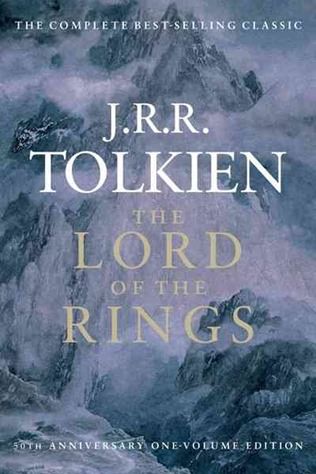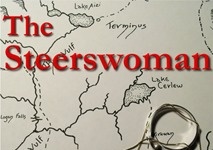 "I read the 100 ‘best’ fantasy and sci-fi novels—and they were shockingly offensive," says Liz Lutgendorff in her NewStatesman attack on a 2011 list from National Public Radio here in the U.S.
"I read the 100 ‘best’ fantasy and sci-fi novels—and they were shockingly offensive," says Liz Lutgendorff in her NewStatesman attack on a 2011 list from National Public Radio here in the U.S.
At least that’s how the headline sums it up.
So what was the fuss about? More than 60,000 of the NPR faithful voted in “The top 100 Science-Fiction and Fantasy survey.” Writing four years later, Ms. Lutgendorff says too many old books scored well in the survey, along with those she regarded as anti-gay or demeaning to women.
A part-time Ph.D. history candidate at Oxford Brookes University University in the U.K., she applied a variant of the Bechdel test to NPR choices (led by The Lord of the Rings trilogy):
“1: Does it have at least two female characters?
“2: Is one of them a main character?
“3: Do they have an interesting profession/level of skill like male characters?"
So what do you think? Should we use modern norms in judging old classics?
I myself would cut them some slack and consider the authors to be just the messengers, as Mark Twain was in describing the slavery-sullied America that served as a backdrop for The Adventures of Huckleberry Finn and other classics. It’s correctly been said that science fiction reflects the period in which it is written. Stop holding dead writers and older ones up to contemporary standards in creating the masterpieces of yore. This isn’t to justify racism or sexism, merely to call for a little commonsense.
A few decades from now, what transgressions will the humans of 2015 have committed by future standards? Perhaps I shouldn’t beat up on robots so much.
The rise of e-books makes it all the more important to resist heavy-handed political correctness and censorship. Remember, you needn’t burn E. You can just do a batch delete. This is one reason why, although a fervent booster of well-stocked national digital libraries, I also want bookstores and independent public domain sites to thrive—lest the PC police enjoy too much control. Ms. Lutgendorff says that "In my day job I work for the Government Digital Service as a content designer." Good. Better that she be that than a librarian. Ms. Lutgendorff almost makes me want to cheer for the Sad Puppies.


































No, it’s not PC Think.
This is literary criticism.
Everyone concerned about recent trends in what we might call crypto-censorship needs to read Ben Urwand’s The Collaboration: Hollywood’s Pact with Hitler. Based on access to movie company archives from the 1930s, it’s a depressing tale.
What was the chief argument that Nazis used to pressure American movie makers to not produce certain films? The claim that the films were offensive to Germans. Nor did that argument begin with the Nazis. Liberal Weimar Germany, upset that films about World War I often put them in a bad light, made similar demands.
The key difference was that, as a dictatorship, the Nazis could put more force behind their demands. They could not only keep a film out of Germany, they could tell a Hollywood studio, “release this film and you will not be able to distribute any films in Germany.”
Money spoke very loudly in Hollywood. It’s why during Hollywood’s ‘Golden Age’ you find almost no films even remotely critical of events in Germany at the time. Attempts to create them were crushed by the studios. Only when war made sales to Germany impossible did Hollywood change its tune.
In power, the Nazis also used Germany embassies to make sure that Hollywood wasn’t producing a sanitized version for Germany and a more critical film for the rest of the world. Not offending Germans meant not informing the entire world.
—-
Even more disturbing, given the great movie-making skills of Hollywood, Nazi propaganda minister Goebbels found that some American films promoted Nazis ideals better than their German equivalents. Gunga Din (1939), for instance, makes British colonial rule over India seem self-sacrificing and heroic. For a Germany planning to occupy Eastern Europe, that was useful and the film got extensive play in Germany.
Worst of all, as the war was ending, Hollywood tried to get the U.S. to drastically cut back on the German film industry, leaving the country heavily dependent on Hollywood imports. Money clearly ruled in Tinseltown. Fortunately, that idea was nixed.
—–
Years ago, I was involved in an academic debate that hints at the real reason for much of the squawking.
Dietrich Bonhoeffer was a German Lutheran theologian who stood up to and was executed by the Nazis. He was certainly a heroic figure. But he was also a typical German male of his era in his attitude toward women.
When it came time to publish his collected letters, there was a fierce debate. Some wanted his put-downs of women sanitized and some did not. Listening to the fuss, I realized what was going on.
The sanitizers see history as a battle between enlightened, progressive people who are never wrong and reactionaries who are are never right. Their world view could not survive a Bonhoeffer so progressive he died fighting the Nazis but not progressive, as they saw it, in his attitudes toward women. He had to be turned into a 21st century liberal even at the cost of lies and censorship. Everything, past, present and future, must conform to progressive dogma.
—-
When the debate is over fiction, the stakes are even higher. Tolkien’s hobbits not only ‘sin’ in liberal eyes by not including women in their party, they have a little community in which both men and women seem happy in traditional roles. That must not be. Unprogressive, traditional worlds must always be portrayed as unhappy places. (And never mind that, in hobbit thinking, going off on an adventure is a bad thing.)
—–
The Sad Puppies debate illustrates another aspect of that. Much of the clash is between those who want scifi, graphic novels and the like to reflect the progressive dogmas and those who simply want to enjoy interesting, stimulating tales. They want good entertainment not politics.
Years ago, I read someone who made an interesting observation. Liberals, he wrote, are rarely religious, so they end up ascribing ultimate values to their political views. Dissent, in their eyes, becomes heresy, hence political correctness and the repression of dissenting views on college campuses. Religious wars have become secular wars.
On the other hand, conservatives tend to have religious views that provide ultimate answers that aren’t dependent on the winds of politics. Their heaven is in heaven, so there’s no need for the nasty zeal to make a heaven on earth that often creates a hell instead. And when that zeal is directed to literature, the result is often book bashing.
—-
Our calendars often a good illustration that religious v. non-religious distinction. Catholicism and later the Protestants, have had no problem with our dreadfully pagan calendars, with months named after deified Roman emperors and weekdays named after Nordic gods. That was just convention and meant nothing.
Contrast that to revolutions like that of the French, which tried to rename the calendar or, more recently, efforts to change BC to BCE and AD to CE.
For centuries religious people have had no problem with calendars that days named after Thor (Thursday). But modern secularism can’t tolerate BC (Before Christ) and AD (Latin for In the Year of Our Lord). Their urge to sanitize the world and to purge out all that isn’t fitting with progressive dogma is so great that they’ve created they’ve created two new terms that they’re attempting to impose, BCE (Before Common Era) and CE (Common Era).
What’s the meaning of “common”? Absolutely none. It merely purges out a hated word, Christ, with another starting with the same letter. It doesn’t even change anything. Their calendar still dates from the mistake about the year Jesus was born. What it illustrates, I told one professor trying to promote the idea of BCE/CE is that modern secularism has, in a few decades, become more intolerant of ideas in considers heresy than Christianity has in two millennium. Secularism lack tolerance.
There are reasons. One is that religion makes a distinction between believers and unbelievers, with differing standards for each. I believe St. Augustine refer to this as the difference between the City of God and the City of Man.
I saw that years ago when I was passing through the Jerusalem bus station on the eve of Passover. I had a loaf of bread with me and a little Jewish boy began to say to me, “Lo, leven, lo leven, Pesch.” I knew more than enough Hebrew to know he was telling me, “Do eat leven bread, it’s Passover.” Unfortunately, I didn’t know enough Hebrew to discuss theology. Only later did it come to me that all I needed to say was, “Ani lo Jehudi,” or “I am not Jewish.”
Secularism permits no such differences. There’s no escape from secular dogma, not for people and certainly not for literature. All is the City of Man. There is no City of God.
That is why, in Obama’s world, Catholic nuns must fund abortions and Evangelicals must assist homosexual marriages. That sort of thing. Religion is no excuse. All must toe the line. It’s cultural and religious fascism from secularists.
That’s why even books written long ago must be retroactively purged or at least demonized and left unread. Nothing must remain that challenge that One True Faith. And the fact that the faith has no God behind history means that it must be all the more intolerant and repressive.
–Mike Perry, Inkling Books
Part of the point of criticism is to spark thought and discussion about the object of the criticism. From that point of view, I think you could say it’s worked. 🙂
There have certainly many examples of misogyny in fiction, some stem from the author, some for the story line, and some from the necessity of plot.
Ms. Lutgendorff’s three rules are ridiculous and arbitrary. For example, let’s apply to Solaris by Stanislaw Lem. (A book THAT should be in the top ten!)
1: Does it have at least two female characters?
No. There are only four characters on an isolated space station. One is “female”; or maybe not, not really. It’s an alien created from the memory of a male.
2: Is one of them a main character?
Yes. The “female” is a main character.
3: Do they have an interesting profession/level of skill like male characters?
Does not apply. She has no profession or level of skill comparable to human characters. It’s not a Star Trek alien manqué – a human funny ears or forehead. It’s completely alien.
Now, to be fair, the book was written in Polish in 1961, and if it were written in 2015, maybe some of the other characters could have been female, but forcing rules wouldn’t have improved the book.
Books can not and should not be retrofitted for current social standards. Who knows what those will be in fifty years, and today’s books will then cause offense.
Oh myyyy… what’s next? A literary work would be “offensive” unless it has every race as lead characters? Every profession? How about every social strata?
But her intent does not appear to be sparking discussion. Rather, she wants these classics devalued based on her ideology.
I really don’t understand her arguments. The books on the list are older book, which is understandable. They’ve stood the test of time and people still find them entertaining, despite their flaw. You can’t put the hottest new politically correct book on that list because who knows if twenty years later anyone will even remember it.
Yet because these books are older they are going to represent the values and time period of the people that wrote them. Part of the appeal of some of them is looking back and seeing the flaws of the writer’s time period that are interwoven in the story line. The Forever Wars was actually more interesting when you hold it up to the writers views of the Vietnam war and see shades of his own time period in the story. Thinking a writer in the 60’s should have the same moral values of someone now, even if they are a sci- fi writer, is ridiculous.
Also as a woman I hate her little test. A book doesn’t need to have a quota to fill on gender. If a book has a cast full of women that just as good a book chalk full of men, or a book with a diversified mix of both genders. A story shouldn’t have to be tailored around some PC agenda to be good or entertaining. I find it annoying that people think every story absolutely has to have a female MC to be good when gender is just 1 small piece of an overall character. Not to mention writing styles and plot are just as important.
@David: Well, another part of the point of criticism is often to ascribe motives to the author other than what she actually had. So you see, I’m permitted to do that, too. 🙂
Yeah, the article leans towards more literary criticism than pc police paranoia. And just because the works are “great” never absolves them off being problematic. Sometimes glaringly so.
@MP and @Chris: Get rid of the Bechdel-style test and I’ll take the Lutgendorff essay more seriously as literary criticism. Keep in mind that I’m keen, keen, keen on diversity and went after the publishing industry and libraries in the Baltimore Sun—given their disgraceful record in minority hiring. I want at least long-term diversity goals. And of course, aside from racial diversity, women need a chance to get to the very top in publishing. But all this is entirely different from shunning immortal works just because their authors weren’t PC enough by modern standards.